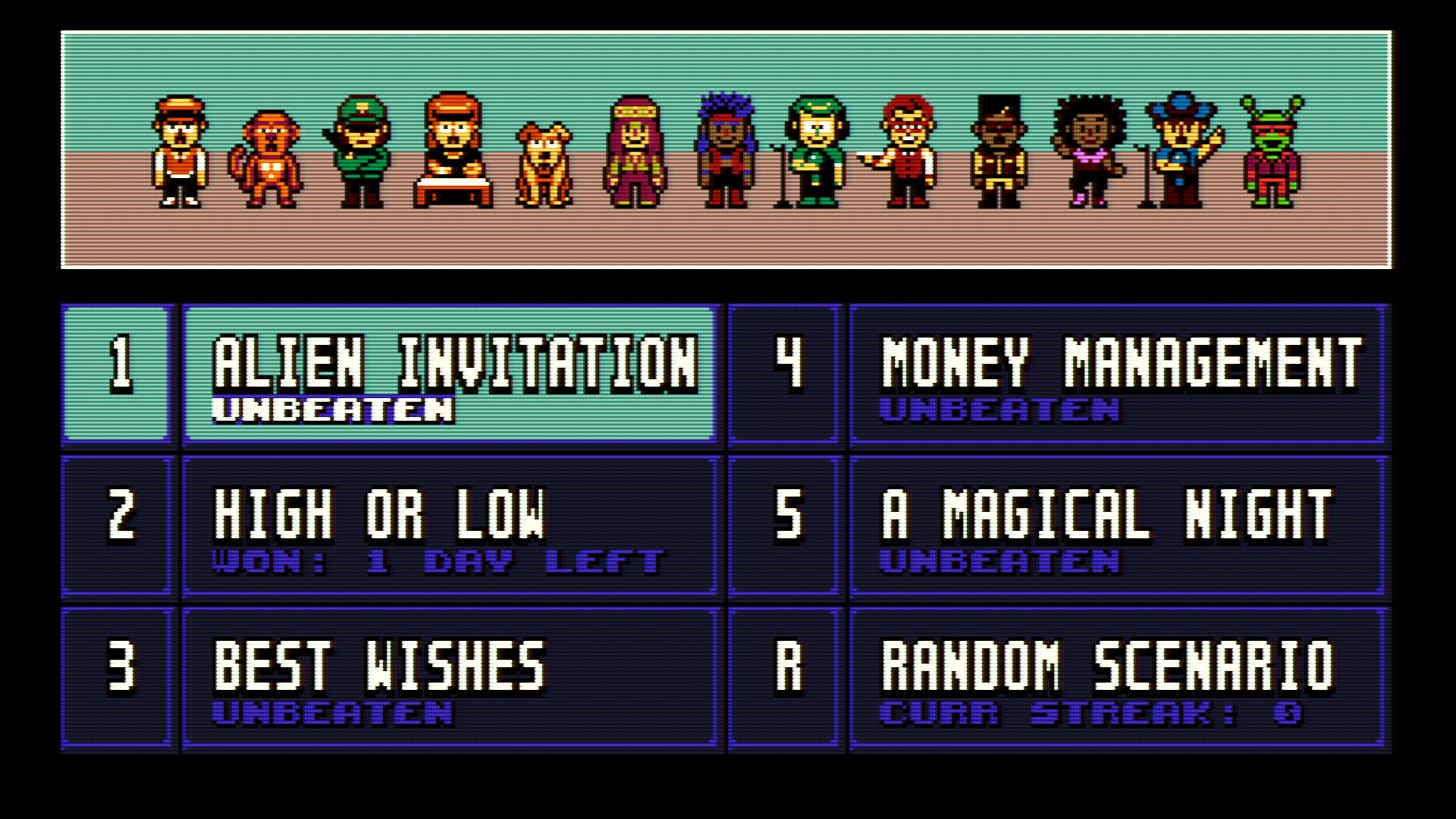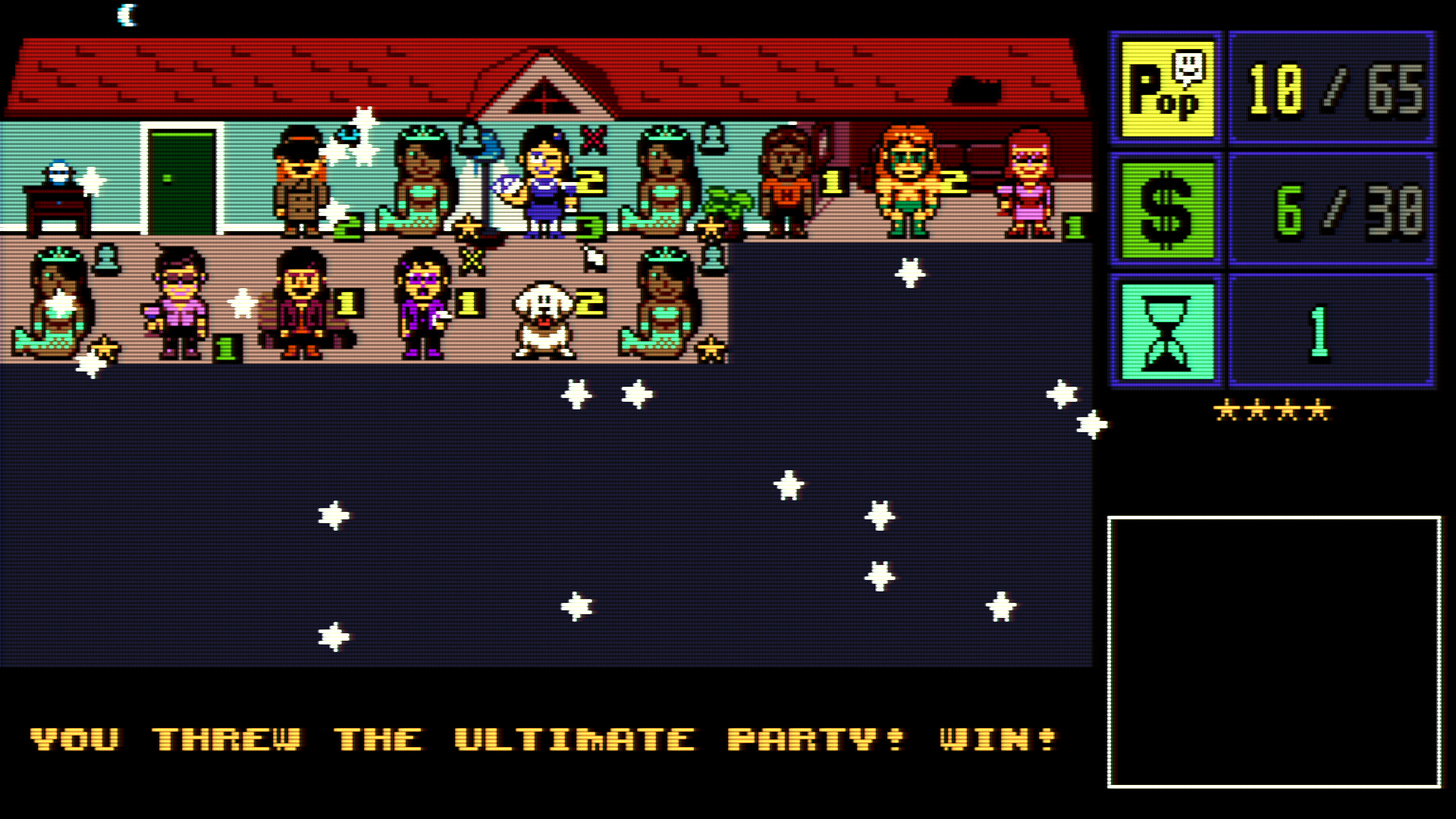25 games down, we’re at the halfway point! What better way to celebrate than to throw an almighty rager, one so popular that the guest list includes dinosaurs, mermaids and even martians!
Party House is a fiendishly moreish game, a sort of take on Poker mixed with the currently-in-vogue deck builder genre. A title that is bursting with character, inventive in its mechanics and, unfortunately, has had me swearing til my face is blue.
The core statement of Party House, and the reason why it evokes the likes of Poker for me, is this ‘one more go’ mentality. It’s a gambling game, essentially, albeit one with particularly unusual stakes.
You’re presented with two aspects: A house, and people to invite. You have limited space to fit these people, and you have to keep it light and breezy. That means not going over the limit, lest you incur the wrath of the fire department, and keeping your troublemaking friends to a minimum, else the police will come by and shut everything down.

Guests appear at random, you largely don’t know who’s going to come through the door, and this is what crafts the major, and most exciting friction of this game. Is that one more turn the key to victory? Or simply your downfall?
All of this is informed by the other two aspects the player has to be aware of. Each campaign has a victory condition that is largely informed by resource gathering, and also a definitive time limit.
The time limit is self explanatory. Get this done in 25 rounds or lose. The resources though? That’s an interesting rabbit hole to go down. There are two currencies in the game: Popularity, and cold hard cash, both earned from specific types of party guest appearing each round.
The popularity is what you bank to add new guests to your rolodex, essentially the deck building component of the game. The money opens up new slots in the party house so that you can bring more folk into the festivities.
So you end up with this interesting push-pull of choice in the game, because those rounds go by quickly, you need a reliable source of income to keep generating so that you can bank the big bucks on one of the star guests, the victory condition of the game. You need four of those bad boys in order to win.

It's not easy. Triggering the police or fire department means you lose any currency gained during that round, and this is remarkably easy to do, because those troublemakers come round with frightening frequency.
There are ways to mitigate this risk, but each one involves inviting a guest with a specific function, often without any material gain to the round themselves, or at the very least a limited one. That’s a slot that could be better used for another cheerleader to boost your popularity multiplier, or clairvoyant hound to filter out the unpopular losers who keep coming to your door.
You even want to make room for some of the troublemakers because despite the grief they give you, they are popular. Get some chimps in the mix! Folk hear a chimps going to be at a house party they’re definitely going to want to come!
Every choice made within this game is a fascinating addition to a surprisingly complex ecosystem. At its heart it's a numbers-go-up logistics game, not that dissimilar to the likes of Balatro, and like that fiendish, memetic card game what harks the key to victory or failure is your own ability to make decisions early on about how you want to play.

That need to curry enough variety of guests to mitigate trouble and bolster your coffers rubs up against the very tangible requirement of getting very specific guests to arrive before time runs out. Too many cooks spoil the broth, too many chimps and all your left with is flung shit and a bit of a bloodbath.
This all sounds like I’ve had a brilliant time with the game, however, the more I played Party House, the more I grew tired of it. There are five scenarios to play, each with their own bespoke rolodex of guests, but each one falls afoul of the same problem. There is an exact point in every run where you have implicitly lost, and it’s impossible to really know when that is.
This is not like Chess, where an expert player can play the clairvoyant doggo themselves, seeing many moves into the future to determine their own successful ventures. A decision made poorly, early on, might come back to haunt you. Or it might not.
You might get all the special gold star guests required for the victory condition and then have none of them turn up at the critical moment. This happened to me far too many times to ignore.
More often than not I found myself restarting the game with increasing frustration because I just wasn’t getting the picks I wanted. I appreciate that this is very much a personal psychological hang up of mine, but it went a long way to making me end up resenting an experience I otherwise had loved.
What would I do to change it? I don’t know, I'm not a game designer. Maybe the problem is exclusively me. It should come as no surprise that I'm not exactly a bag of laughs at real parties either.





I had only recently managed to play this one at an event, but only the multiplayer mode. I found that to work really well as it adds a few more layers to it. The purchasable characters are from a shared pool so getting them becomes a little more strategic, and having an opponent gives a more tangible reason for risk taking. The only downside is the matches can go on a bit long.